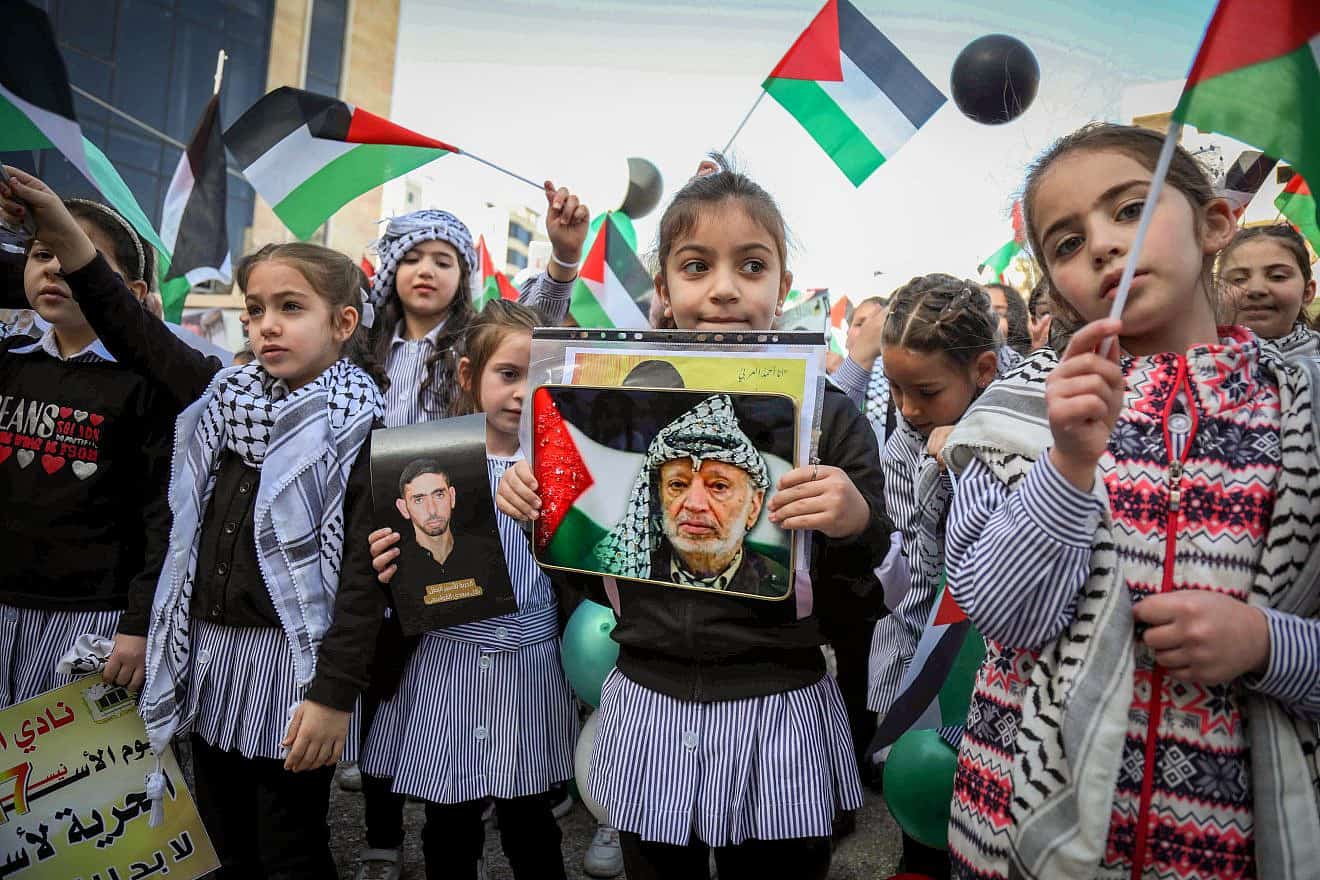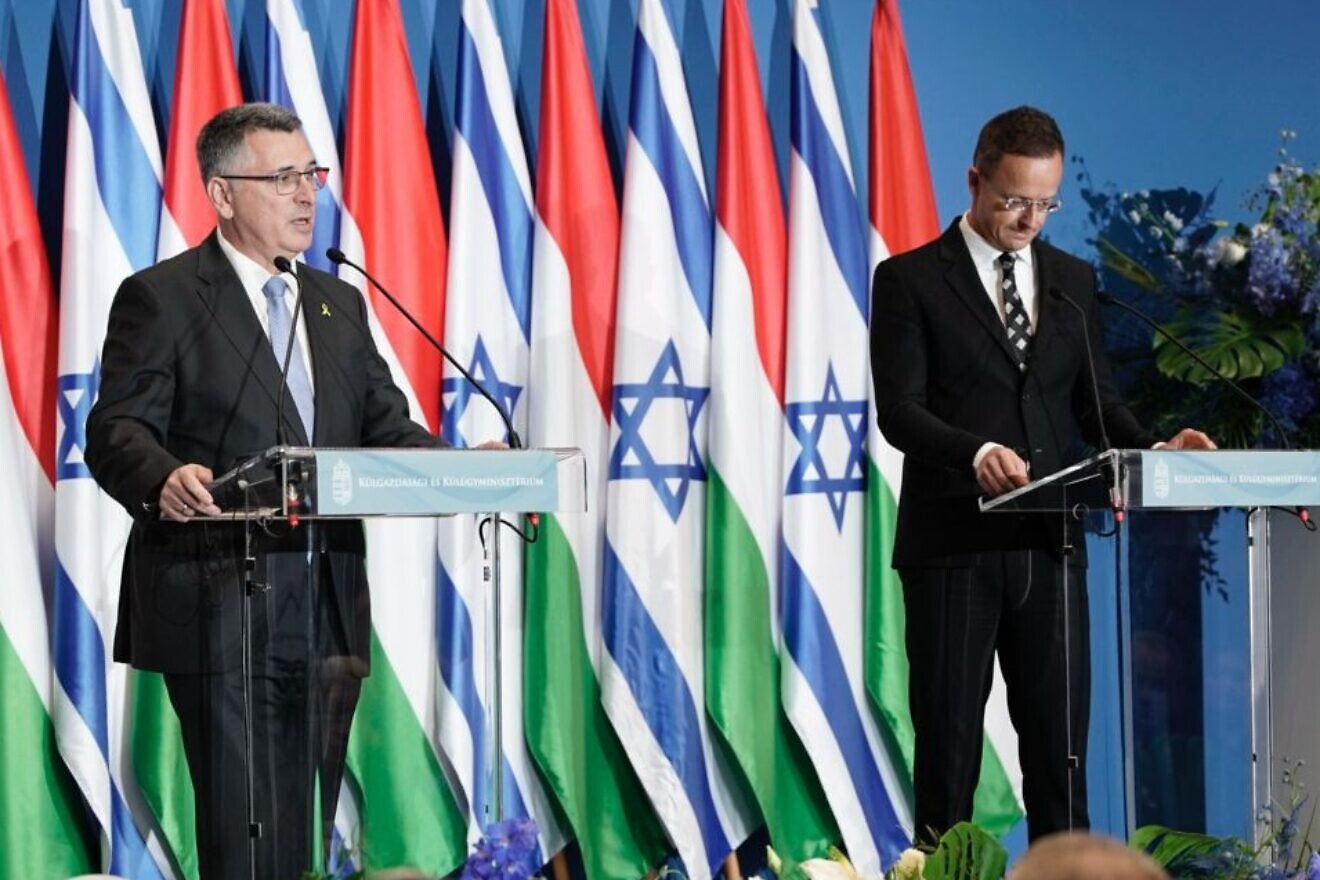by David Isaac
The P.A. attempted to mask the fact that it is still making payments to terrorists after announcing it was stopping the practice last month, according to Palestinian Media Watch.
 |
Palestinians rally in the Judean city of Hebron in
support of terrorists held in Israeli jails, April 22, 2024. Photo by
Wisam Hashlamoun/Flash90. |
The Palestinian Authority not only continues to make payments to terrorists’ families as part of its “pay-for-slay” program, but is attempting to hide that fact, an Israeli media research group reported on Oct. 26.
After numerous countries, led by France, recognized Palestinian statehood in September, P.A. President Mahmoud Abbas announced on Sept. 1 in virtual remarks to the U.N. General Assembly that the P.A. was ending what it calls its “Martyr’s Fund” as part of a “comprehensive reform agenda.”
The fund is a program through which terrorists are rewarded stipends for carrying out attacks against Israelis. Payments typically go to the terrorists’ families.
However, “This month they tried to hide that it was paid,” Itamar Marcus, founder and director of Palestinian Media Watch, told JNS.
The P.A. usually makes these payments a day or two after paying its regular employees, according to Marcus. This time there was a two-week delay, which caused unusual unrest, including demonstrations and threats against the P.A. itself, he added.
PMW discovered the P.A.’s ruse through its extensive monitoring of Palestinian social media posts.
Families expressed anger that the money wasn’t waiting for them as usual at their local post office. P.A. funds delivered through the post office are solely Martyr’s Fund payments, according to Marcus.
It’s particularly significant that the P.A. would risk public anger as it’s struggling to regain popularity against Hamas, which has become wildly popular with Palestinians after the success of its Oct. 7, 2023 massacre, he noted. “The PA has been trying to reestablish favor among Palestinians. Paying salaries to terrorists is one of their main strategies to do so.”
However, a member of the Commission of Detainees and Ex-Detainees Affairs finally put the word out to families that the payments would be waiting for them, though no official announcement would be given, said Marcus.
Palestinian Authority (PA) payments to prisoners & the families of ‘martyrs’ were made on Saturday at PA post offices.
— Israel Foreign Ministry (@IsraelMFA) October 27, 2025
Palestinian ‘Pay for Slay’ isn’t over, despite assuring the world they stopped.
This policy encourages terror. It must stop. https://t.co/EuzIeqCFCS
“That is critical. The P.A. never officially announced it. It didn’t want the international community to know,” he added, noting that the Europeans had congratulated the P.A. for stopping the program.
“That the P.A. was willing to risk the ire of the population shows the lengths it’s willing to go to hide these payments from the international community,” he said.
The trick might work, at least with the Europeans.
“Europeans are definitely desperate to look the other way and to find every excuse they can to support the P.A.,” he said.
French President Emmanuel Macron, for example, made much of a letter he received from Abbas in June, in which the P.A. president declared he was “revoking the law on payments to families of prisoners and martyrs.”
Macron posted the five-page letter in full to his X account, calling it “a letter of hope, courage, and clarity. The President of the Palestinian Authority, Mahmoud Abbas, charts a course toward a horizon of peace.”
I received a letter of hope, courage, and clarity.
— Emmanuel Macron (@EmmanuelMacron) June 12, 2025
The President of the Palestinian Authority, Mahmoud Abbas, charts a course toward a horizon of peace.
A condemnation of terrorism, the release of hostages, the demilitarization of Hamas, an end to the war in Gaza,… pic.twitter.com/zQ2ZgEOQ5k
Significantly, Abbas’s letter was never mentioned in Al-Hayat Al-Jadida, the P.A.’s official newspaper, according to PMW. Praise from the French president would normally be widely publicized, but the P.A. deliberately kept it quiet, Marcus told JNS.
(Prisoner payments enjoy 91% support among the Arab public in P.A.-controlled areas, according to a 2017 poll.)
A week before Abbas sent the letter to Macron, he was quoted in Al-Hayat Al-Jadida applauding Hamas’s Oct. 7 attack, praising it for shaking “the foundation of the Israeli entity.”
Abbas’s only caveat: “As important as the goals that Hamas attempted to achieve through this attack may have been, it’s not comparable to the damage and the losses in the Gaza Strip.”
“Abbas is literally praising these goals as important goals. And then a week later, along comes Macron and announces that Abbas canceled pay-for-slay,” said Marcus.
Quoting a Sept. 4 Wall Street Journal editorial about the letter and Macron’s reaction to it, Marcus added: “It’s as if France’s president said to Mr. Abbas: Lie to me. Now Mr. Macron can pretend to the world that he’s doing something for peace.”
Israeli Minister of Foreign Affairs Gideon Sa’ar, having seen PMW’s report, refuted the idea that the P.A. had reformed. During a press conference with Hungarian Foreign Minister Péter Szijjártó in Budapest on Monday, Sa’ar said, “Contrary to the PA’s promises in English, they are continuing their pay-for-slay policy. Paying salaries to terrorists and their families for murdering Jews and Israelis has been Palestinian law since 2004 and until this very day.”

“The P.A. rewards Palestinian terrorists—including Hamas—with Jewish blood on their hands: those sitting in jail and those released for example in the last deal,” he added.
“The P.A. never stopped pay-for-slay. They
just changed the method. The terrorists are collecting their payments
from the Palestinian Post office.
And the P.A. is now making additional payments to evil terrorists released as part of the deal,” Sa’ar said.
While Hungary showed moral clarity where the P.A. was concerned, the same could not be said of the European Union, said Sa’ar. “Instead of holding the P.A. accountable, the European Union whitewashes it.”
This isn’t the P.A.’s first attempt to deceive Western nations. On Feb. 10, the P.A. announced it was restructuring its payment allocation system.
This, too, was widely seized upon as evidence that the P.A. was ending pay-for-slay. However, the P.A. has shelled out terror payments monthly since that announcement, without pause.
Similarly, in 2014, when the program first came under public scrutiny and the P.A. felt that its global funding stream was threatened, it declared that it was closing its Ministry of Prisons and would no longer be paying terrorist salaries.
What the P.A. did was replace the Ministry of Prisons with the Commission of Detainees and Ex-Detainees Affairs, which operated with the same staff and buildings, carrying on business as usual, according to Marcus.
The P.A.’s terrorist reward system is only a symptom of the problem, he continued. Abbas sent Rawhi Fattouh, head of the Palestinian National Council, and Raed Abu al-Hummus, head of the Palestinian Commission of Detainees, to Egypt to greet prisoners released as part of the Israel-Hamas ceasefire deal, he noted.
They delivered a message to the prisoners, referring to them, in Abbas’s words, as “blessed brave heroes.”
“Terrorists are the superheroes of the Palestinian Authority. And that’s what they tell their people. And sending down Rawhi Fattouh and Raed Abu al-Hummus to Egypt tells us that there is no change in the fundamental approach of the Palestinian Authority to terrorism,” said Marcus.
David Isaac
Source: https://www.jns.org/palestinian-authority-caught-hiding-terror-payments-despite-claims-of-reform/
No comments:
Post a Comment